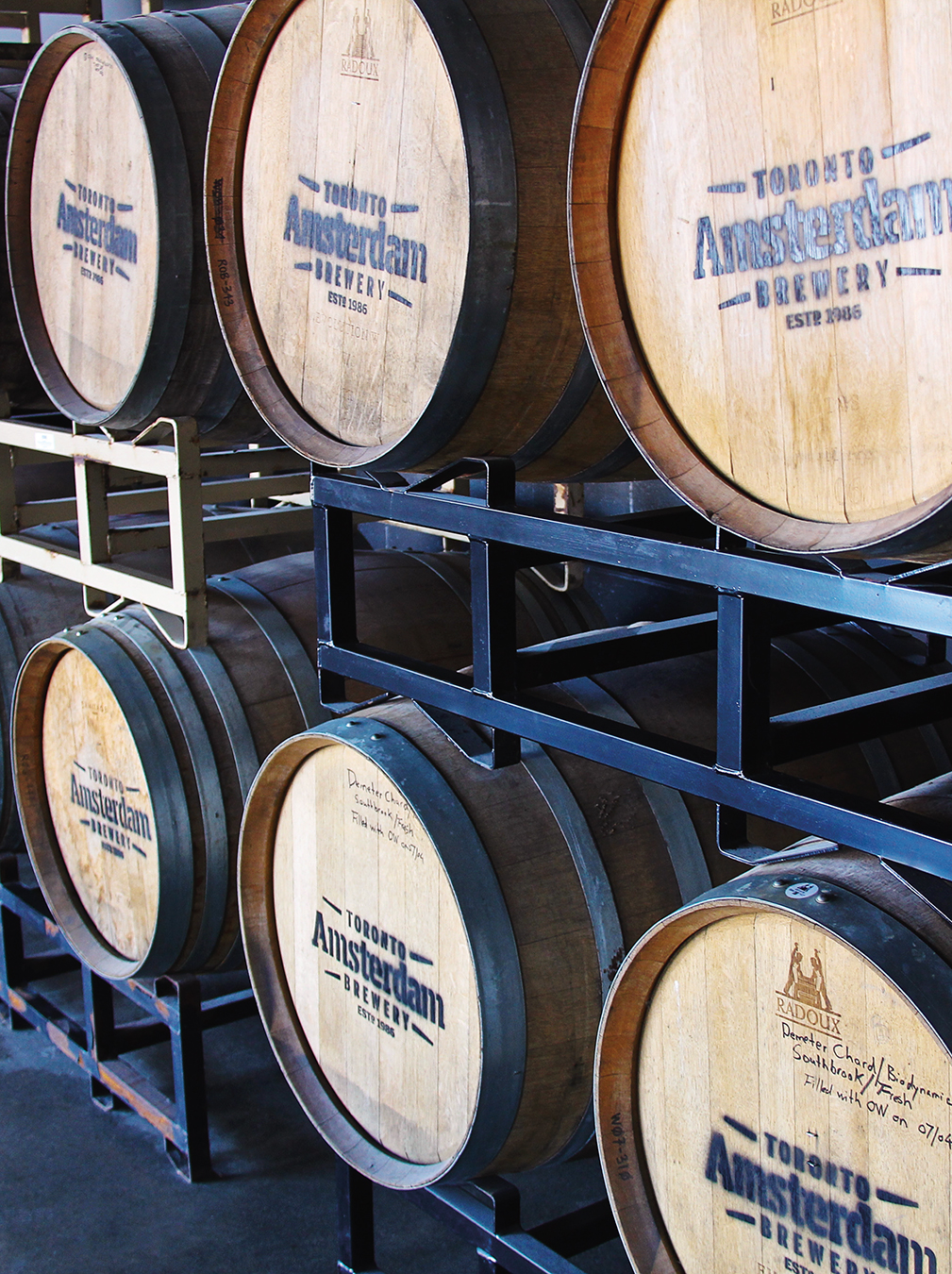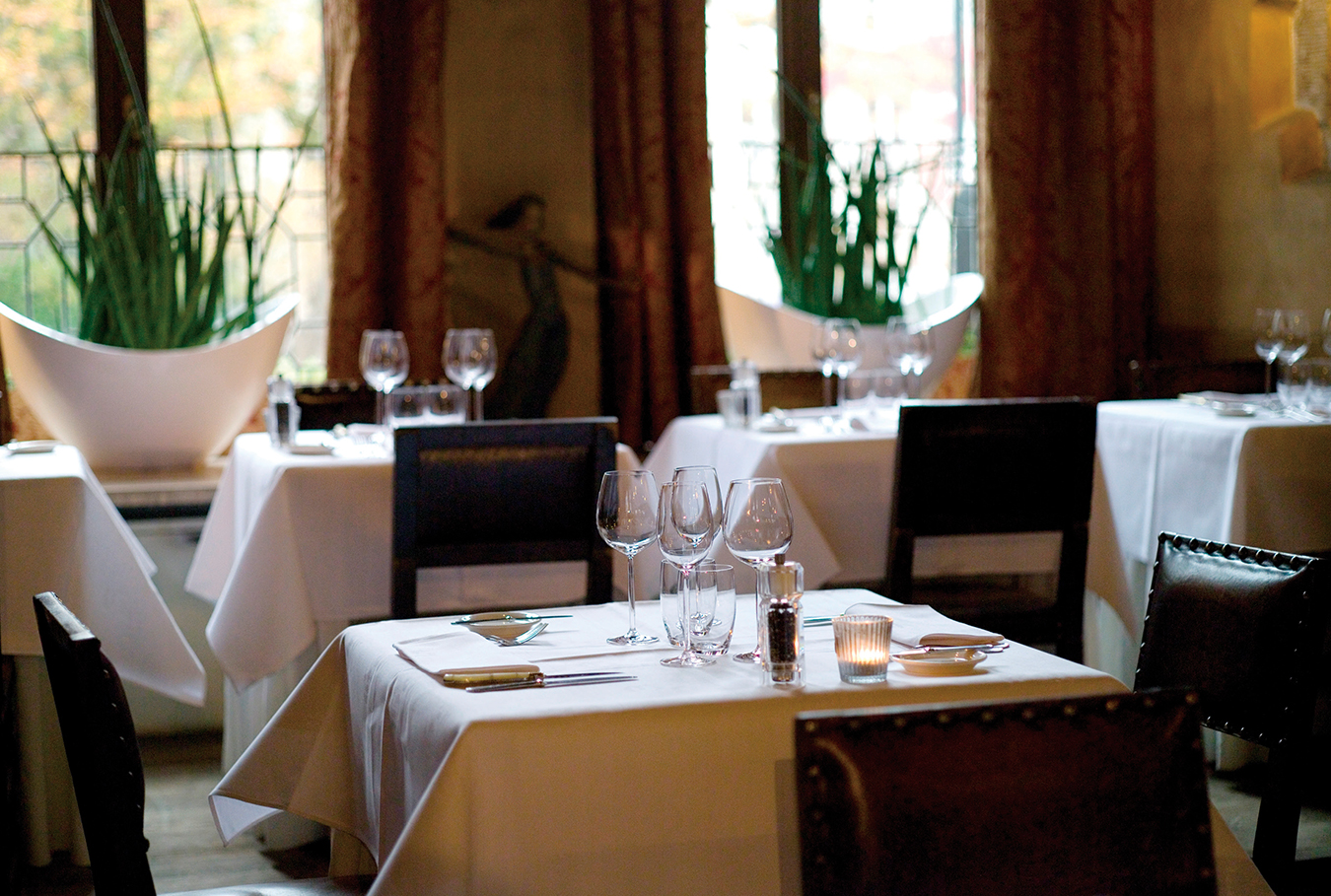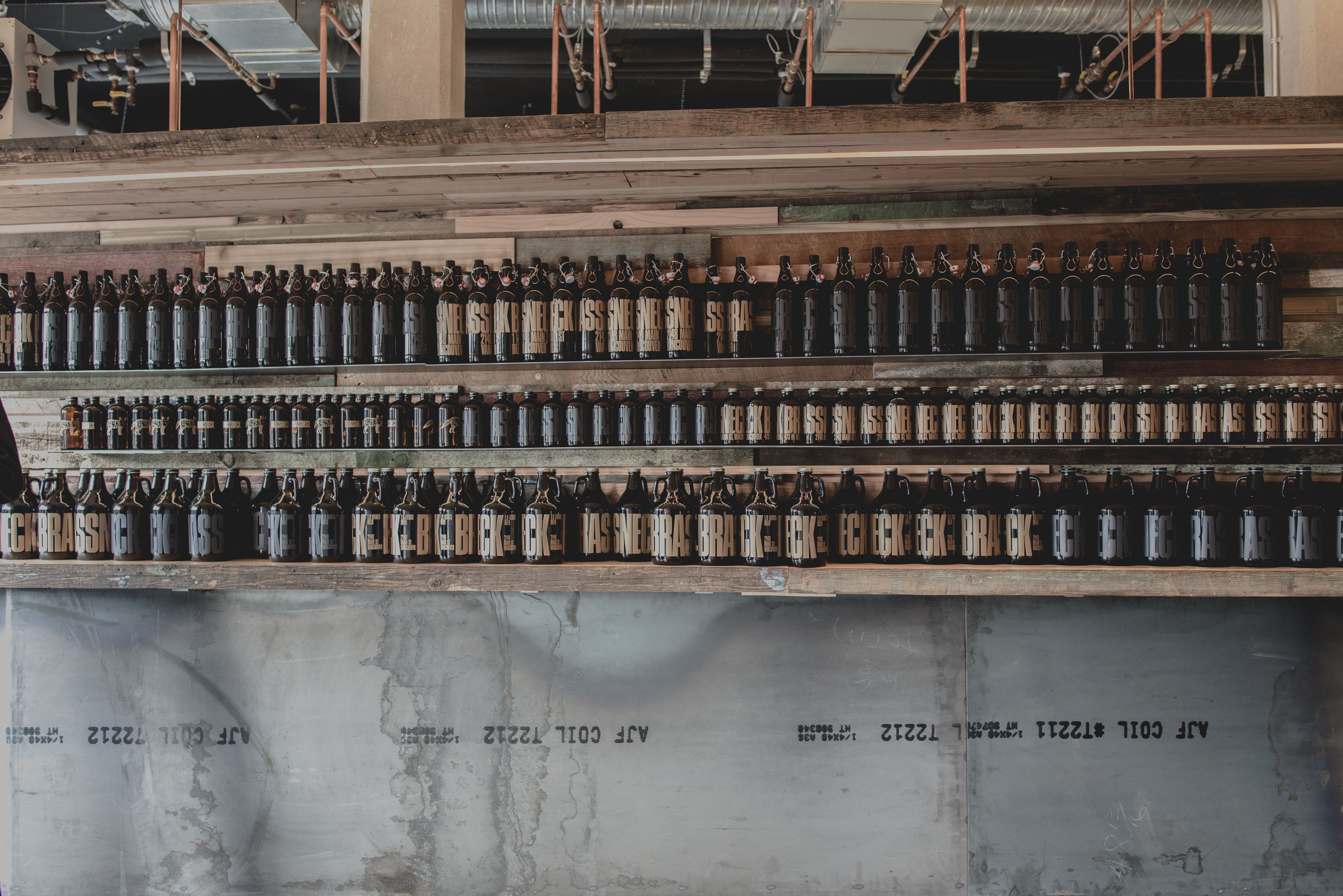-
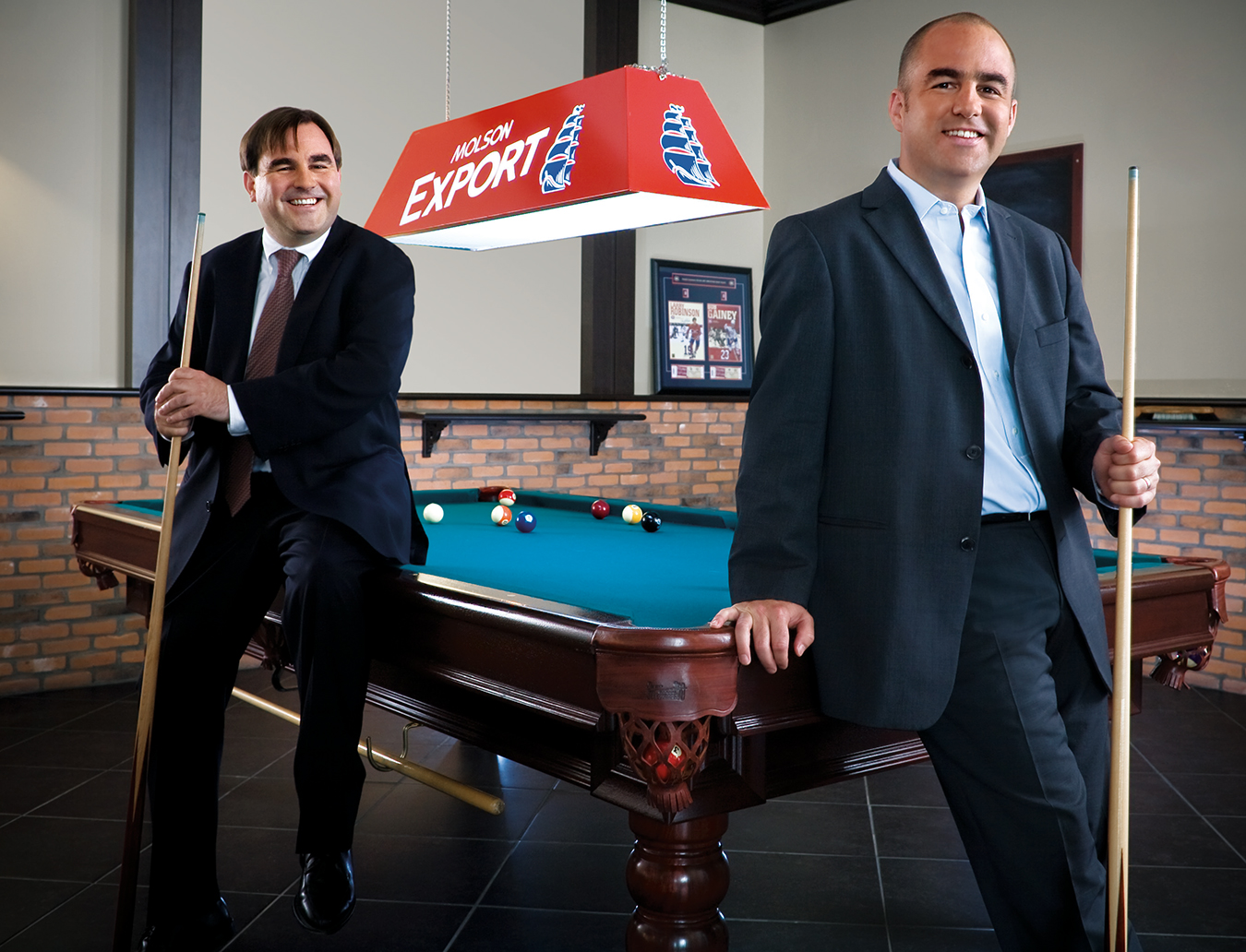
Andrew and Geoff Molson.
-
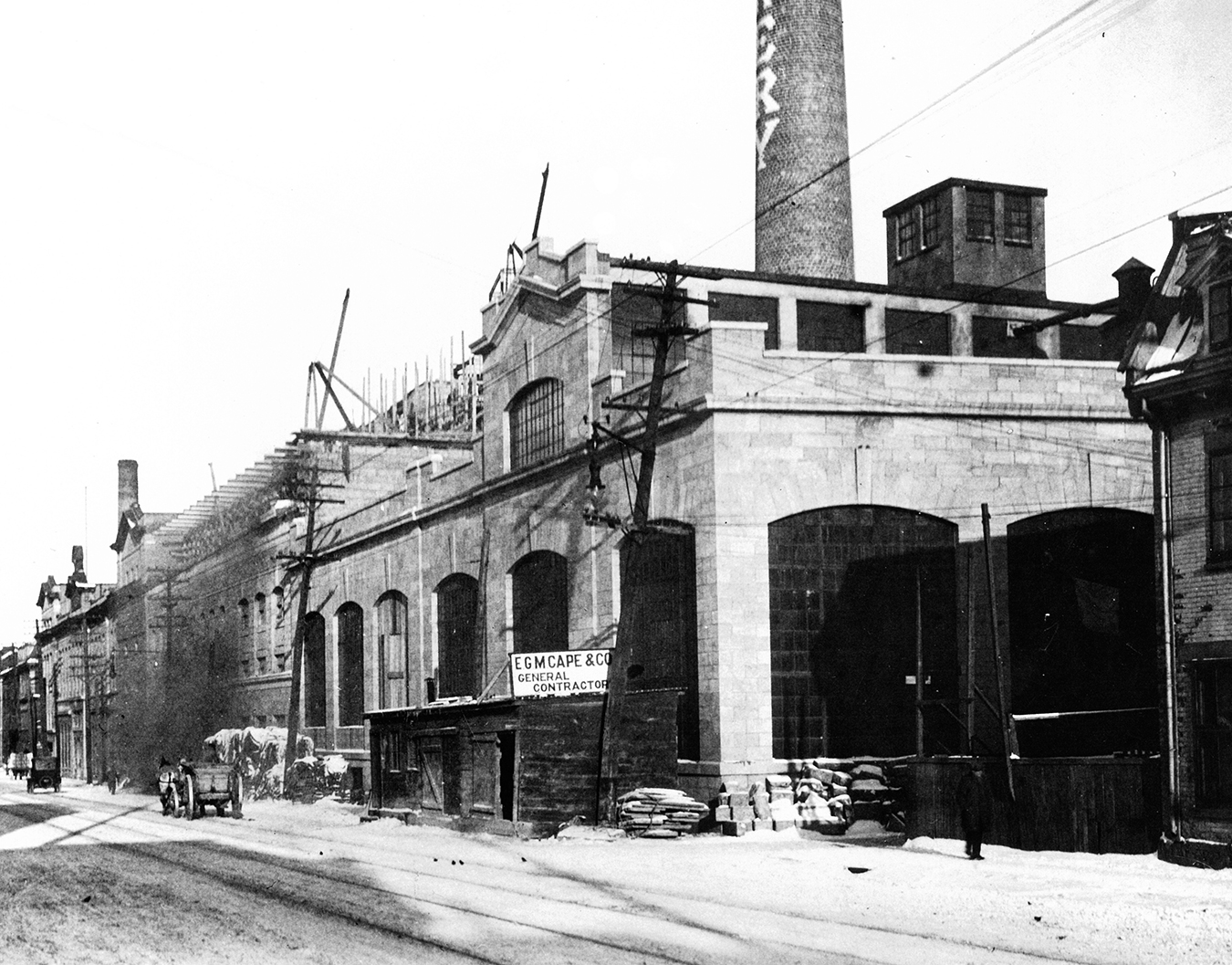
Boiler house of the Molson Brewery in Montreal, 1921.
-
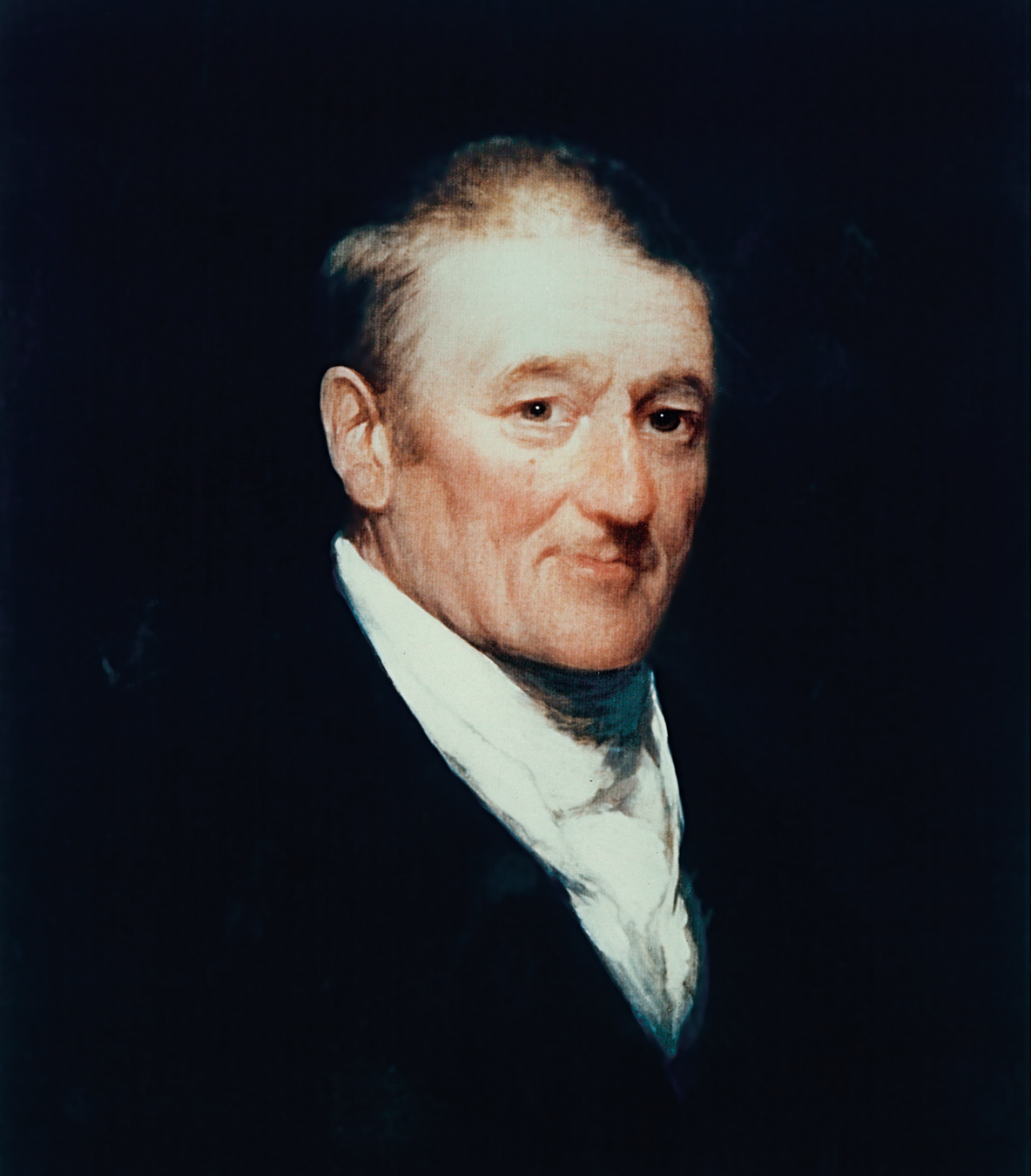
Portrait of John Molson, 1811.
Molson
Brewing legends.
The Molson cafeteria looks more like a bar than a lunchroom. A chain of little, square Molson Ex banners hang from the ceiling and extend halfway around the room. Frosted windows display Molson logos. A large Molson Export lamp hangs over the pool table at the front of the room. And the requisite fridge is stocked with various brands of Molson brew. When Geoff and Andrew Molson arrive at the cafeteria, they greet everyone enthusiastically and settle into playing a little pool for their photo shoot.
Thirty-eight-year-old Geoff, a self-described “beer guy”, cracks jokes between shots and teases his older brother about fixing his tie. Andrew, 41, tells the group that Northrop Frye once described hockey as “the great northern ballet”. It all seems like fun and games, but this seventh generation of Molsons is looking to continue the legacy of Canada’s oldest brewer at a time of increasing complexity and globalization. And the question is, are they up to the challenge?
The company founder, John Molson, immigrated to Canada from Lincolnshire, England, in 1782 and opened the Molson brewery in 1786. Other breweries that had previously opened in New France shut down, but Molson saw opportunity in the influx of the British. The brewery did well, and John Molson went on to build a fleet of steamboats and Montreal’s first permanent theatre, Theatre Royal; he was also a major contributor to the creation of the Canadian National Railway.
Subsequent generations were just as enterprising. When John Molson died in 1836, his sons Thomas, William, and (by some accounts) John Jr. took over the business. William opened the Molson Bank in 1855, which merged with the Bank of Montreal in 1925. During the 1950s and 1960s, Senator Hartland Molson, who held the positions of president, chairman, and honorary chairman of the company during his tenure, expanded the family’s brewing operations nationwide. In 1957, he and his brother purchased the Montreal Canadiens hockey team along with the Montreal Forum, before selling the team to Molson (the company) two years later.
The family is still involved, but the business has changed significantly—it isn’t John Molson’s Molson. In 2005, Molson merged with Coors. The parent company, Molson Coors Brewing Company, owns Molson in Canada and the Coors Brewing Company in the U.K. It also jointly owns the newly formed MillerCoors in the United States with SABMiller. With dual head offices in Montreal and Denver, Molson Coors determines the vision and strategy, oversees all the business units, and reports results. Geoff and Andrew’s dad, 71-year-old Eric Molson, who was trained as a chemist and master brewer, is currently vice-chairman of the board at Molson Coors. And now Geoff and Andrew are carrying on the tradition in different ways: Geoff works as vice-president of marketing at Molson and Andrew serves on the Molson Coors board of directors.
You might assume that Geoff and Andrew were pressured to go into the business. But that wasn’t the case. In fact, the opposite was true. “I put the pressure on him [my dad],” Geoff explains. But Eric believed in earning the right to work at Molson. So after Geoff graduated with a BA from St. Lawrence University in New York, he took a job at Coca-Cola. He then got an MBA at the Babson College business school in Boston and worked as a consultant at Kalchas Group in New York.
Finally, 10 years ago, the time was right to join the company. Molson was divesting itself of other businesses it owned and getting back to beer, which excited Geoff. So he came on board as an account manager for large restaurants including Philthy McNasty’s and the Keg. It was an entry-level position, but that didn’t bother Geoff. “I was great with it,” he says. “There’s a lot to learn about the beer business.” He progressed through various roles at Molson in Canada and the U.S., returning to Montreal in 2006.
It would be easy for Geoff to adopt an attitude of entitlement at the company, but he’s not like that, according to his boss, Kevin Boyce, president and CEO of Molson. “He wants to be treated like any other employee,” he says. “Geoff is extremely enthusiastic and well liked by the employee population because he is a genuinely nice man with a visible passion for the Molson business.”
The middle brother, Justin, has a degree in landscape architecture and does not work in the family business. “He’s a very close family member who sits around the table with us and talks about hockey and beer,” Geoff says.
As for Andrew, he’s been a Molson Coors board member since the merger in 2005. In his day job, he is a partner and vice-chairman at Montreal-based RES PUBLICA Consulting Group, which owns two public relations companies: Cohn&Wolfe Canada and NATIONAL Public Relations. “Contrary to Geoff, from a young age I had no desire to work at the company. I was interested in other things,” says Andrew, who holds a law degree from Laval University, a BA from Princeton University, and an MSc in corporate governance and ethics from University of London. He decided the best way for him to contribute to the family business was from a governance perspective.
The combination of preserving continuity while looking forward permeates much of what goes on at Molson.
But even though Andrew chose to work elsewhere, he’s still fiercely passionate about the brand. You’ll never catch him chugging back a Labatt’s Blue or a Budweiser. In fact, when RES PUBLICA has partner meetings at hotels or restaurants, the company checks that the venue serves Molson beer. “Sometimes we change venue because of that—it’s important to have Molson beer when we have an event,” says Luc Beauregard, chairman and CEO of RES PUBLICA.
Next to beer, the other thing the Molsons are passionate about is hockey. Molson sponsors the six Canadian NHL teams and still owns a 19.9 per cent stake in the Montreal Canadiens. Geoff sits on the board of the Canadiens, as well. Indeed, Geoff’s office is somewhat of a shrine to the team. Pictures of the Habs hang over his desk and a stack of pucks sits on his windowsill along with Molson beer bottles from various eras. Hockey sticks belonging to famous Montreal Canadiens lean against the back wall behind his chair. Ownership has its privileges.
The fact that the Molsons are taking time out of their busy schedules to do an interview signals a departure from family tradition. One of their ancestors famously said that a Molson’s name should only appear in the newspaper three times: at birth, marriage, and death. Eric Molson has always preferred to stay out of the spotlight. But the seventh generation recognizes that times are different—they want customers to know the Molson story.
Andrew says the family think of themselves as long-term committed shareholders in a public company. While Beauregard, who served on the Molson Coors board for eight years, confirms this, Molson Coors is a controlled company, which means the majority of Class A shares—which hold the bulk of voting rights—are held directly and indirectly by the Molson and Coors families.
But if you’re a shareholder, you’re probably not complaining. In 2007, net sales grew 6 per cent to $6.2-billion (U.S.). Molson Coors generated $515-million (U.S.), or $2.84 per share, in consolidated income from operations, a 38 per cent increase over 2006. And their market capitalization surpassed $10-billion (U.S.) for the first time. (In 2008, sales weren’t quite as bullish, as they were expectedly affected by the global economic downturn; shares closed out the year at $2.16.)
In December 2007, Molson Coors signed an agreement with SABMiller to combine their U.S. brewing businesses into a single entity, MillerCoors. Leo Kiely, who was previously CEO for Molson Coors, now heads up the new MillerCoors. The combined company will boost U.S. market share to 29 per cent, second only to Anheuser-Busch (Budweiser and Bud Light), the largest brewer in the U.S., at 48 per cent. MillerCoors will also be able to realize cost efficiencies. These include fuller truckloads of beer, the ability to negotiate better prices due to larger volume buys, and the ability to supply locally with additional breweries (Miller adds six to Coors’s two), which will help with high distribution costs.
“[MillerCoors] is talking $500-million in synergies,” says Eric Shepard, executive editor of Beer Marketer’s Insights, a trade newsletter based in New York. “There’s really savings up and down the line and it should make them a stronger competitor to Anheuser-Busch. The challenge they face is to market this new portfolio of brands which have been marketed against each other for years, particularly Coors Light and Miller Lite.”
The picture looks rosy, but it wasn’t always so for Molson shareholders. For almost three decades, Molson ran a conglomerate. The diversified organization owned Beaver Lumber and part of Home Depot Canada in the hardware sector and Diversey in the chemical sector. It was not a profitable strategy. Additionally, Molson had sold its brands to Miller Brewing and Foster’s Brewing Group in the U.S. The family wisely decided to refocus on beer.
In 1999, Molson hired Dan O’Neill as CEO to execute the “back to beer” strategy, which he did in short order. The company jettisoned its outside interests, and paid $133-million (U.S.) to buy back its brands from Miller and Foster’s. O’Neill also cut $100-million (U.S.) from costs over three years and raised beer prices, which increased operating profit by two-thirds between 1999 and 2002. The stock price tripled.
But in 2002, O’Neill made a significant strategic error. With the intention of making Molson an international player, he guided the company in purchasing 80 per cent of Cervejarias Kaiser, Brazil’s second largest brewer, for a staggering $765-million (U.S.). It was a disastrous decision. Kaiser was plagued with distribution problems. The Coca-Cola bottlers failed to get the brand into the million-plus points of sale in Brazil. “Molson needed its own dedicated sales team if it was to have any hope of breaking into a foreign market where the competition was fierce, yet it opted to rely on the cola bottlers, who gleaned only minimal revenue from Kaiser,” writes Andrea Mandel-Campbell in her book Why Mexicans Don’t Drink Molson. Molson eventually hired 1,200 salespeople and outfitted them with scooters, but it was too little, too late. They were no match for Ambev, the largest brewer in the country. Instead of making Molson a global player, the acquisition weakened the company.
With that plan scuppered, Molson had to strengthen its position. In 2004, it announced its intention to merge with Adolph Coors to form (at that time) the fifth largest brewer in the world.
Yet more rocky times were ahead. Some analysts thought the merger was a bad idea. Also opposed was Ian Molson, a distant cousin and a former head of European investment banking at Credit Suisse First Boston, who had been on the board since 1996. For a family that had had very little internal dissent, it was an unhappy exception. But Andrew insists it didn’t cause a rift. “He was one of the few who were opposed to it … Senior management going down want[ed] to do this transaction. So did the union … And the board of directors was in favour of the company’s decision to go in this direction.”
Ian Molson left the board in June 2004, the “merger of equals” went through in 2005, and the shareholders benefitted in the end. “Some decided to take their shares and invest elsewhere, but those who decided to stay were rewarded a lot,” Andrew says. Since the time of the merger, the share price has risen 48 per cent.
The Molsons enjoy working with the Coors family. “What we find in the Coors family is exactly what we are,” Andrew says—that is, a family committed to the beer business for the next 200 years.
In 2006, Molson Coors finally sold its majority stake in Kaiser for a mere $68-million (U.S.) to Kaiser’s distribution partner FEMSA Cerveza, keeping just 15 per cent of the company. FEMSA agreed to assume Kaiser’s debt as well, estimated at $60-million (U.S.). Given the fire sale, the Molson boys are remarkably charitable when asked about O’Neill. “We’re not finger-pointing people and he did some great things for our company … and now he’s gone and we’re in a new phase,” Geoff says.
With the MillerCoors merger, Molson Coors will be able to look at other markets. The CEO of Molson Coors, Peter Swinburn, has said the company would consider increasing its footprint globally if it can do so while improving shareholder value. “To the extent that MillerCoors succeeds and makes money for Molson Coors, it will obviously help fuel expansion,” Shepard says. The operation is expected to generate at least $210-million in additional revenues by the third year.
But what’s to say the company won’t make another Kaiser-like blunder? “It’s impossible for anyone to guarantee that the next one is going to be way more successful, but there’s no question that we always look for the best balance between risk and reward and fit with the company,” Geoff says.
Given globalization and consolidation trends, expansion has become a necessity for a brewer who wants to be a player in the market. In July 2008, Anheuser-Busch accepted InBev’s $52-billion (U.S.) takeover offer, and the transaction, which closed in November 2008, despite legal challenges, should make the company the world’s largest brewer by volume. “It [the merger] would probably put more pressure on Molson Coors to expand internationally more quickly,” Shepard says.
In April 2008, the company secured a sponsorship deal with the Vancouver 2010 Olympic and Paralympic Games. The Vancouver Organizing Committee for the 2010 games felt that Molson’s long history of supporting Canadian sport and athletes made the brewer an ideal partner. Molson also sponsored the Vancouver 2010 Bid Corporation. Sponsorship rights began on January 1, 2009, and cover the games and the Canadian Olympic team for Vancouver 2010 and London 2012. Molson has pouring rights at all competition and non-competition venues.
The Olympics is a new marketing initiative, but by no means the only one of note for Molson. The “I Am Canadian” advertising campaign, which began in 1994 and ended in 2005 when the company merged with Coors, was enormously popular. The commercials aired both in Canada and the U.S. and tapped into Canadian national sentiment. The wildly popular “Rant” commercial, for example, featured Joe, a regular guy, sounding off about proud Canuck traditions that distinguish Canadians from their southern neighbours. More than a commercial, it became a rallying cry for Canadians.
Perhaps less well known than its clever commercials, but certainly no less significant is Molson’s philanthropic work, a pillar of the company’s strategy. It can be traced back to John Molson, who was one of the key private citizens to found Montreal’s first public hospital, Montreal General Hospital. In 2007, when the company opened a brewery in Moncton, Molson staff split up into teams and dedicated half a day to presenting financial support to worthy community causes. A local family recreation centre and an organization that prepares meals for single mothers’ children were among the recipients. Geoff and his team also volunteered at Action Nouvelle Vie in Montreal and spent two days preparing grocery bags for families in need at the food bank and delivering groceries to those who couldn’t pick them up. “That was great for everyone, and it makes you proud to work here,” he says.
Additionally, the Molson family has been supporting hospitals, universities, and other causes of merit for years through its foundation, of which Andrew is vice-president. Concordia University renamed its commerce facility the John Molson School of Business in 2000 after the Molson family donated $10-million to the university. To date, the foundation has donated a total of $20-million to the school. The foundation has also given grants to Douglas Hospital Centre, the Montreal Heart Institute Research Fund, the Canadian War Museum, the Canada Council for the Arts, and the Boy Scouts of Canada National Council, to name a few.
The combination of preserving continuity while looking forward permeates much of what goes on at Molson. In his office after the photo shoot, Geoff points out a child’s painting of the Habs logo hanging on the wall. One of his sons painted the picture. Geoff’s a father of four, and Andrew has two children. “We have an eighth generation that is alive and well,” Geoff says, and Andrew adds with a laugh, “We’re starting the training early.” The next generation obviously figures into future plans, but will their kids want to go into the family business? “If they deserve it and merit it,” Andrew says. “It’s what we’re all about. We don’t work any other way.

